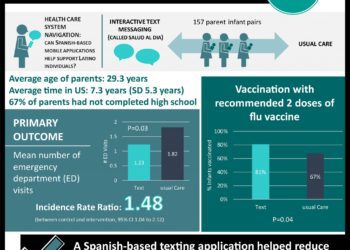Texting intervention reduces ER visits and improves vaccination rates among Latino families
1. In this randomized controlled trial, a Spanish-language texting application significantly decreased the rate of emergency room (ER) visits among the intervention population.
2. A greater proportion of infants in the intervention group received the recommended second dose of the influenza vaccine as compared to the control group.
Evidence Rating Level: 1 (Excellent)
Study Rundown: While Latinos are the largest minority group in the United States, this population often experiences challenges in navigating the complex United States healthcare system. In this study, researchers investigated whether using a Spanish-based mobile application could support Latino individuals in gaining meaningful access to the health care system. The application, known as Salud al Día, consisted of interactive text messaging for parents throughout their child’s first year of life. The application included appointment reminders, support for obtaining medicines and completing referrals, as well as illness care monitoring and education. The intervention resulted in a significant decrease in the number of emergency room visits among those in the intervention group when compared to those in the control, and also demonstrated an increased rate of influenza vaccination among the intervention group. There was no significant difference in the number of well visit no-shows between the two groups. Although some health parameters were not affected by the use of the mobile application, these results demonstrate how use of current technology can meaningfully support patient populations who typically struggle with navigating our health care system.
Click here to read the original article, published today in Pediatrics
In-Depth [randomized controlled trial]: This study was conducted at an urban, academic general pediatrics clinic in the United States. This clinic has an average of ∼13 000 visits annually and primarily serves a population of publicly-insured, Latino children with immigrant parents. Parents or legal guardians of publicly-insured, singleton US-born infants were eligible to participate. Salud al Día text message interactive sequences included appointment reminders, support for obtaining medications, assistance with following up on referrals, and education around common illnesses. Text messages included an interactive component to the application. A total of 157 parent-infant pairs were ultimately included in the study, with 79 randomly assigned to the intervention and 78 to usual care. The mean parent age was 29.3 years and mean years living in the United States was 7.3 years (SD: 5.3 years). Sixty-seven percent of parents had not completed a high school education. The mean number of ED visits in the intervention group was significantly lower at 1.23 (SD: 1.66), while the mean ED visits among participants in the control group was 1.82 (SD: 1.64; P = .03). The incidence rate ratio comparing emergency department use between the control and intervention groups was 1.48 (95% confidence interval: 1.04–2.12). More infants in the intervention group received the recommended 2 doses of the flu vaccine as compared to infants in the usual care group (81% vs 67%; P = .04). Well visit no-shows approached significance, with only 34% of intervention group participants having 1 or more no-shows as compared to 49% in the control group (P = .06).
Image: PD
©2019 2 Minute Medicine, Inc. All rights reserved. No works may be reproduced without expressed written consent from 2 Minute Medicine, Inc. Inquire about licensing here. No article should be construed as medical advice and is not intended as such by the authors or by 2 Minute Medicine, Inc.







